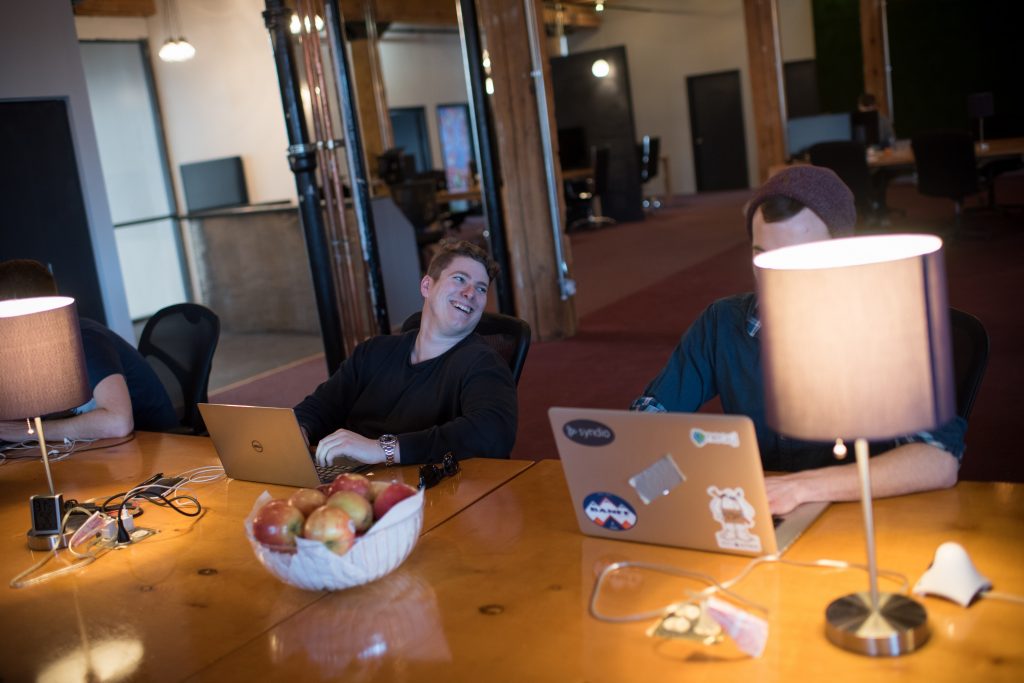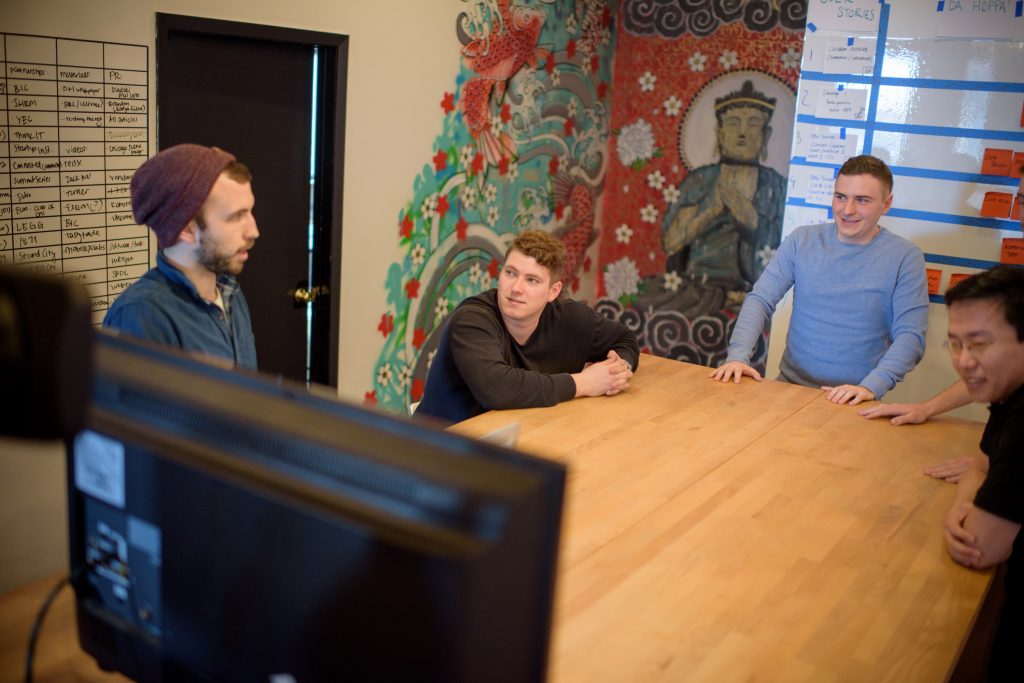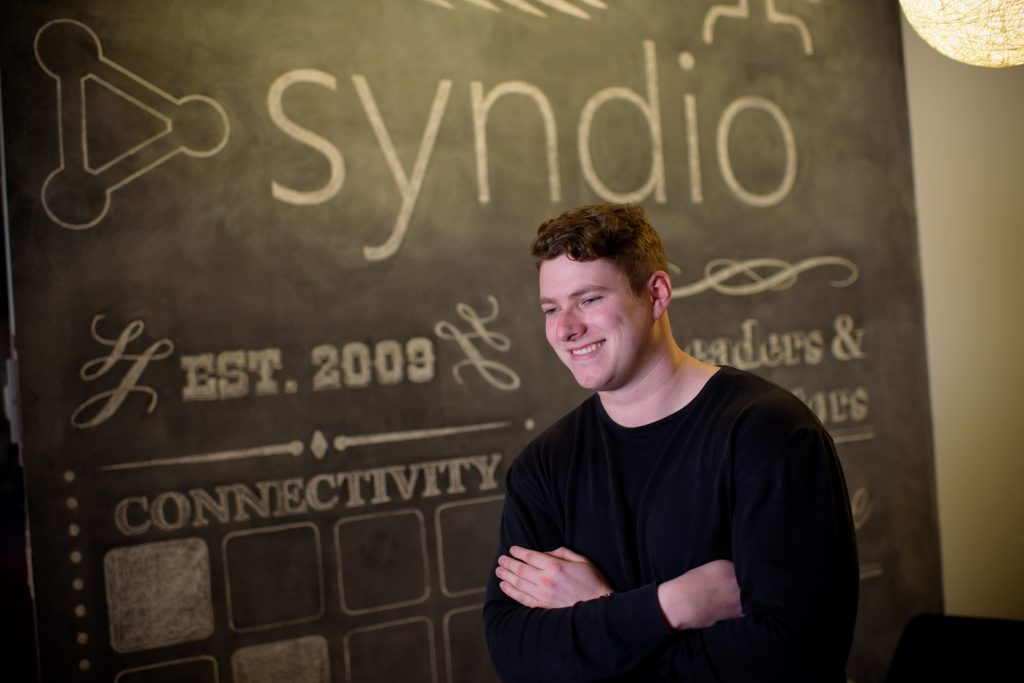Syndio packs a punch in its people analytics dashboard
When Zack Johnson pulls on his boxing gloves for an intense workout, the 6-foot-1-inch, 225-pound entrepreneur punches the speed bag like a true heavyweight. He’s producing the same knockout impact with his startup, Syndio, a Chicago-based pioneer in software that reveals how people work together — what it calls relational people analytics.
Boxing offers “a mirror on entrepreneurship,” says Johnson, the company’s CEO. “It’s incredibly cerebral. My upper body and lower body are supposed to be like a cat, but my waist is supposed to be like a bear. It’s all about when to move in, when to step back, how to adjust. In boxing you have to do 50 things kind of well and two things really well to win. Entrepreneurship is the same. You have to decide exactly what your business is going to be great at.”

Syndio has just 10 full-time employees, whom Johnson calls “a scrappy bunch” with a David-versus-Goliath attitude. Its size belies its data-gathering, number-crunching prowess: Customers ranging from an international airport to a Fortune 500 company use Syndio’s people analytics dashboard to elevate personnel decisions from instinct-based to data-driven.
Serious tools for serious business
One way Syndio takes on competitors — whether other startups or the giants of HR information systems — is with robust technology that drives collaboration and boosts productivity. In its early, bootstrap days the company used free software unsuited to the task, which meant Johnson and his team spent too much time trying to make tech do what they needed it to. To transform into a contender, it needed more.
“Technology is the magic of the 21st century for entrepreneurs,” Johnson says. “Things that make your life easier — that’s what you’ve got to exploit. You have to have serious business tools to do serious business.”

For Syndio, Microsoft tools mean serious business. Skype for Business is “huge,” Johnson says, because he spends about half his time interacting with customers, and other video services didn’t measure up. “We have used WebEx and GoToMeeting and Facetime, but Skype just works.”
Reliable video calls let him work face to face with out-of-state clients, or consult with his business advisor based in France. “It’s like we’re standing next to each other because we have a reliable videoconferencing tool. Nothing gets the job done as quickly and effectively as Skype.”
Syndio employees rely on Office 365 to boost productivity, thanks to cloud-hosted apps and documents available across devices — with no compromise on functionality. They found Excel superior to competing spreadsheets for key tasks such as handling lists of 100,000 or more names.
“We are constantly working with customers who use Microsoft Office,” Johnson says. “These tools help us collaborate faster and more effectively, and build confidence for our customers. Once upon a time our team members would use open-source tools because it was cheaper. It’s great that Microsoft made pricing affordable for startups, because we need real tools and every dollar counts.”
With customers using Office 365, Syndio can access large data pools, which Johnson calls “our Holy Grail.” Long-term data, such as five years’ worth of email traffic, can yield insights such as how diverse or inclusive a workplace truly is — another way Syndio’s solution boosts fair treatment of workers and greater organizational transparency.
The company is also testing the waters with Microsoft Azure cloud services, thanks to a winning sales pitch Johnson delivered at the Chicago 2014 Piranha Tank contest. The prize: free access to Azure services, which Syndio is using for test projects and R&D.
Thriving on connections
A self-described “total extrovert,” Johnson thrives on connecting with people. His enthusiasm carries over to the office, wherever that may be. Syndio began seven years ago in his dorm room at Northwestern University, graduated to his apartment, and now operates from a loft in Chicago’s West Town, in the epicenter of the city’s tech community.
They sublet space to other companies to extend the exchange of creative energy, and encourage activities that boost connections. This manifests itself in some odd rituals. Case in point: Every afternoon at 3:32 an alarm sounds, and everyone stops to eat an apple. “You can’t work 24/7,” Johnson says, noting quirky activities like this show Syndio’s “goofy and playful roots” while promoting a balance of work and downtime, which includes office Xbox contests.

Johnson’s passion for the numbers behind workplace teams took hold at age 20 while he was doing college research on how social networks help teams succeed, but his first paying gig was musical, rather than academic. He sold an extra concert ticket to a friend of a friend, who turned out to be a local hip-hop artist. The chance connection led to Johnson promoting the artist’s music — by tapping into networks of influencers on campus. Johnson credits the project with launching his career, as he then launched a consulting firm built to do the same for companies.
As he learned the tools and approaches for measuring employee interactions, Johnson was shocked to find that large enterprises didn’t do such analysis. “It blew my mind that companies spend billions on talent, but little time or money measuring how well people work together,” he says. “Every company and customer I talked to struggled with the same problem of not having information on how employees collaborate. Once it got stuck in my head, it seemed like an obvious thing I needed to bring to the world.”
He became obsessed, he says. “I dove in headfirst. I had no idea what I was getting into.” As a young founder who grew up while growing a business, Johnson found the combination to be “a recipe for mistakes and hard times.” Over the next seven years he would learn how hard it is to bring something to market, even something that filled an obvious need.
Peer surveys key to measuring collaboration
At the time, measuring the value of workplace collaboration was “kind of a black box” — one that Syndio has since cracked open. “Who knows best about your company? It’s your employees, the people already in it. So let’s ask them. With a systematic way to do that, we could get some pretty enlightening data,” he says. By asking questions — who supports whom, who shares ideas, who drives change — and analyzing the answers, he could help companies find, keep and motivate their high performers. As he puts it, “We answer the big questions managers face every day.”
Whereas most businesses in the space conduct polls that let employees answer only questions about themselves, Syndio solicits peer data so employees also provide input on their colleagues. This yields data for the people analytics dashboard that equips managers to check and apply their intuition and make better decisions — and it prevents employees from being negatively affected by hunches that prove inaccurate. Using the dashboard, managers can study how top collaborators work so they can share these practices across the company, or dig deeper to learn what is causing low scores.
As Johnson notes, it is “a lot more egalitarian. We want to make people better and have workers get the credit they deserve.”

He says one of his own family members is a top salesperson but never gets recognized by a boss who doesn’t believe in giving a glowing review. In contrast, Syndio’s system safeguards against one person’s opinion skewing results. Employees are limited in the number of people they can comment on and, notably, can only say positive things about them.
“Everybody knows someone who is underappreciated at work,” Johnson says. “Most of our customers have either kept someone from quitting or avoided firing someone who was absolutely crucial. One company was about to get rid of a whole division that was really good at something it wasn’t formally assigned to do, and that kept their entire billing system from going down. The results have been very tangible with customers who didn’t know they had superstars.”
What’s next for Syndio is “to swing for the fences,” he says. “The coming years are about making the product awesome, understanding the customer’s problems and being the best enterprise solution while scaling up the business.
“The way companies manage people is fundamentally changing, and we’re trying to be the tip of the spear.”
To capitalize on that change, Syndio will keep delving deeper into enterprise social networks for insights that transform businesses by making them stronger and helping employees shine — a winning one-two punch.
Top photo: CEO Zack Johnson and Syndio dig deep into enterprise social networks. Photos by Rob Hart.








